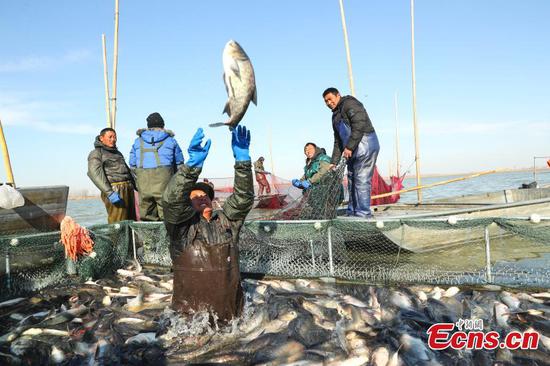Omicron variant adds to strains of record surges as countries rethink curb strategy
The World Health Organization has warned of a "tsunami" of COVID-19 cases with the Delta and highly transmissible Omicron variants circulating at the same time worldwide.
The WHO Director-General Tedros Adhanom Ghebreyesus described the Delta and Omicron variants as "twin threats" that are driving up cases to record numbers, which again is leading to rises in deaths and more hospital admissions.
"I am highly concerned that Omicron being more transmissible, circulating at the same time as Delta, is leading to a tsunami of cases," he said on Wednesday.
"This is and will continue to put immense pressure on exhausted health workers and health systems on the brink of collapse and again disrupting lives and livelihoods."
The WHO has reported 3.5 million deaths from COVID-19 this year, compared with 1.8 million last year. "The actual number is much higher," Tedros said.
His warnings came as many European countries have record numbers of cases and struggle with new restrictions during the New Year holiday season.
France reported 208,000 new cases on Wednesday, the highest in the European Union.
"This means that 24 hours a day, day and night, every second in our country, two French people are diagnosed positive," the Health Minister, Olivier Veran, said.
"We have never experienced such a situation."
Starting Jan 3, remote working will become mandatory in France for those who can. Public gatherings will be limited to 2,000 people for indoor events. But there will be no curfew on New Year's Eve.
In Germany, the Robert Koch Institute for infectious diseases warned that the Omicron variant is likely to spread further to become the dominant variant in the country soon. Germany reported a total of 40,043 new cases on Wednesday alone.
Health Minister Karl Lauterbach said the country's COVID-19 infection rate is probably two to three times higher than figures show. He urged Germans to be "very cautious" during New Year's Eve celebrations and celebrate only in very small groups. Large-scale celebrations have been banned, as has the sale of fireworks. Private gatherings are limited to 10 people, according to new rules that have come into force in recent days.
'Evolution followed'
In Belgium, Prime Minister Alexander De Croo announced on Wednesday that theaters, cinemas and other cultural venues will reopen following a court ruling to suspend an earlier decision to close them.
"We continue to follow closely the evolution of the pandemic in our country, where Omicron is dominant," De Croo said.
The decision last week by the country's Consultative Committee to close the venues was met with mass protests over the weekend and a legal challenge.
While theaters and cinemas will be allowed to reopen, they will be allowed to receive no more than 200 people. Visitors will be required to show a COVID-19 certificate, wear a face mask and remain seated.
The professional sports sector, with events being played without fans now, is also asking for similar relaxations.
Belgium has had a drop in new cases recently. An average of 6,446 new cases were reported every day between Dec 20 and Dec 26, down 21 percent from the previous seven days, Sciensano, the country's public health authority, said on Thursday.
In Italy, the government suspended self-isolation rules on Wednesday for those coming into contact with someone testing positive for COVID-19 providing they have had a booster shot, have recovered recently or have been vaccinated.
The decision was made after health experts urged the government to rethink the policies amid concerns that the faster spread of the Omicron variant could paralyze the country by forcing millions to stay at home.
Italy reported a record 98,030 new cases on Wednesday, and the number of hospital admissions has also been rising.
On Wednesday, Tedros also sounded upbeat, saying he remained optimistic that 2022 can be the year "we not only end the acute stage of the pandemic but we also chart a path to stronger health security".
But he warned that as the pandemic drags on, it is possible that new variants "could evade countermeasures and become fully resistant to current vaccines or past infection, necessitating vaccine adaptations".


















































 京公网安备 11010202009201号
京公网安备 11010202009201号